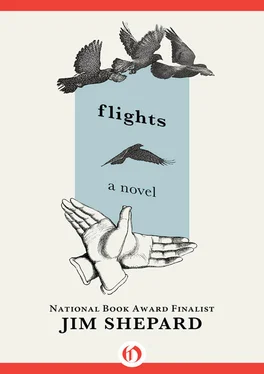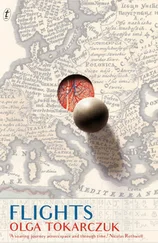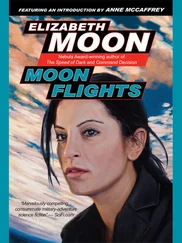Biddy sat beside Teddy and behind Laura, wondering if his voice was any good. Sister was going through the class members, one by one. There were only a few left, himself included. She banged out the introduction to “Joy to the World!” Sarah Alice stood by the upright piano, her hand on the nicked wooden top. She got as far as “Let earth receive her King” before Sister stopped and wrote something on a pad.
“Okay,” she said. “Thank you.” Sarah Alice picked her briefcase off a nearby chair and left, buttoning her coat, unsure whether she’d been accepted or rejected.
“Mr. Bell,” she said. “You’re next.”
Teddy got up and crossed to the piano. Choirs were for fools, he had told Biddy while they had been sitting there.
“Do you know what you are?” Sister said. “Soprano? Tenor?”
“I don’t know. Soprano,” Teddy said.
She looked at him and then launched into “Joy to the World!” He started to sing. She stopped playing, and he went on for several notes himself. The few people left along the empty chairs tittered.
She glared at him. “You sing seriously, young man,” she said. “Or you’ll wish to God you had.”
She played it again, and he sang with absolute seriousness.
“It turns out you have a very nice voice. And you’re certainly no soprano. Mr. Siebert.” She wrote on her pad. “You’re next.”
He took Teddy’s place at the piano. His fingers picked at the scars in the wood. Teddy indicated at the door that he’d wait. Biddy nodded without enthusiasm: Laura was already waiting. He opened the music book to “Joy to the World!”
Sister was looking at him expectantly. “Any idea what you are?” she asked, conscious of the futility of the question.
His temples grew cool. “Maybe a soprano.” His fingers made ghost fingerprints on the wood.
“Soprano’s high.”
He nodded.
She started the song, unconvinced. He knew as he sang that something was off, that he wasn’t singing even as well as he could. She continued to the end before stopping, dissatisfied. “Well, we need sopranos,” she said, and leaned forward, fingering a page. “You want to try something else?” She flipped through the book.
“How about ‘Hark! the Herald Angels Sing’?” he suggested. She agreed, surprised.
She misplayed the beginning and restarted. The introduction rose around him and he watched her, hesitating, and began, weak at first, hearing his voice lost in the huge room, but gaining strength and feeling his confidence grow as he climbed the higher notes. He gained power and swept into the highest parts with his voice ringing clear and strong across the empty floor: “Joyful, all ye nations rise, join the triumph of the skies,” and without loss of power or clarity his voice carried up and over the highest of the bridges: “Hark! the herald angels sing, glory to the newborn King!” Sister stopped, and the room shone. In the silence it was as though the metal chairs were still resonating, holding the sound.
Outside the bare branches of a maple moved silently in the wind, the glass insulating them from exterior sound. Laura shifted in her chair and it squeaked, ending the moment. Sister cleared her throat quietly, and reached out to touch the music book.
“That’s a beautiful voice God’s given you,” she said. “Just a beautiful voice.”
That night it snowed. Biddy and Kristi knelt at the picture window in the living room with the lights out, watching the snow drift down past the telephone pole at the end of the street, the individual flakes flashing like dull fireflies as they passed beneath the streetlight. They were descending in perfect silence and beginning to lightly cover the road.
Their parents had gone into New York to see a play and the baby-sitter had turned off the TV and was reading a book in the den. In the silence they were both listening for the snow, their faces to the cool windowpane, hushed by the snow’s quiet even while they realized that they were behind glass and that falling snow should make no sound in any event.
They could hear the dog bothering the baby-sitter before she let it out. The door slammed and they watched the dog trot into the cold, nose to the thin layer of snow. It, too, made no sound, swinging into the neighbor’s yard, its paw prints showing dark where it crossed the driveway. It stood unmoving with the snow coming down around it, its head to the side and raised, sniffing.
His sister sat back, away from the window. “I’m going to get a sled,” she said. Even she was quiet, beside him in the darkness. “If we had a sled we could go sledding.”
“There’s not enough snow.”
“Tomorrow there’ll be,” she said.
They watched the dog, its nose edging along the base of a tree.
“You were crying last night,” she said.
He looked at her, then returned his attention to the darkness outside.
“What were you sad about?”
He put his palm almost to the glass, feeling the cool air especially on his fingertips. He had the sensation of dipping his hand into shallow water. “Lots of things.”
In the other room the baby-sitter turned the TV back on.
“Will they be able to come back from New York?” Kristi asked.
“They went on the train. That still goes even when it snows.”
There was a sound of a police siren on the television, and cars screeched back and forth. She got up. “If Lisa can’t come over tomorrow, you want to make a snow fort?”
“If there’s enough snow. If there’s enough snow and Lisa can’t come over, we’ll build two snow forts and have a battle.” He got up as well, and turned from the window, following her into the den. The ordered light and noise of the television were warm and welcome after the living room. He stood watching for a few moments before remembering the dog and going back into the kitchen to let it in.
The next morning, his parents were up early and his father was ruining eggs.
“How was the play?” Biddy said. He sat at the table and rubbed his eyes.
“Good,” his father said. “Very good. I recommend it highly.”
“You want some coffee?” His mother had an orange Sanka jar in her hand. He nodded.
“Your sister’s outside.” His father flipped an egg with élan, yolk breaking in midair with a flash of yellow. “She said to come out when you got up.”
“Have some breakfast first,” his mother said.
He got up and went to the window on the back porch. Kristi was hunched in the snow, piling up a mound. “How much is it?” he asked without turning around. “How much did we get?”
“Six inches.” His father’s attention remained largely on the eggs. “How’s that? You kids wanted more snow, you got more snow.”
He ate two of the eggs his father had made, drank some Sanka, and went upstairs and scooped everything out of his winter drawer. He pulled off his pajamas and pulled on a pair of thin cotton socks, and long underwear over them. Over that he slipped heavy woolen socks, choosing carefully from the pile and checking for holes, and then some dungarees. He found his lumberjack shirt and one of his heavy sweaters. He buckled his boots over his pants as a final touch and stood feeling secure and able to roll in the snow without any icy leaks. He grabbed his down mittens and hat and trooped downstairs.
“You need a scarf?” his mother asked as he went by.
“Nope.” He let Stupid out, adjusted his hat, and followed. It felt wonderful in the winter air and he realized he’d been hot and uncomfortable inside with everything on.
“Get your fort ready,” Kristi called. “Mine’s almost done.”
Stupid loped around, tracking rolling areas of white that Kristi had left untouched. Biddy chose a spot away from the house, at the back of the yard, and started to sweep the snow into a kind of wall with his down mittens.
Читать дальше












